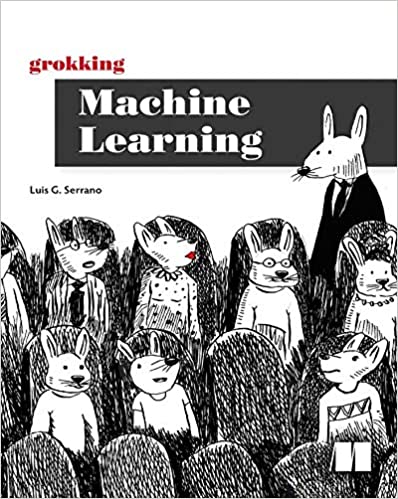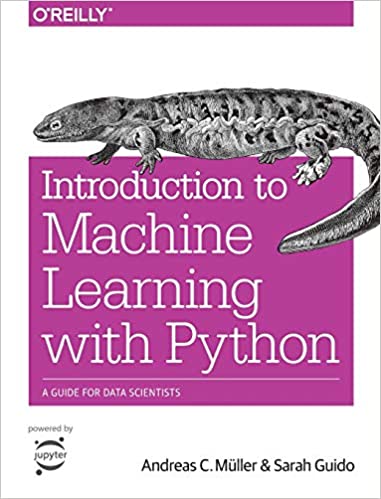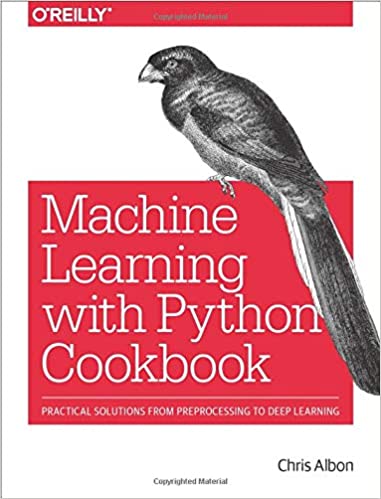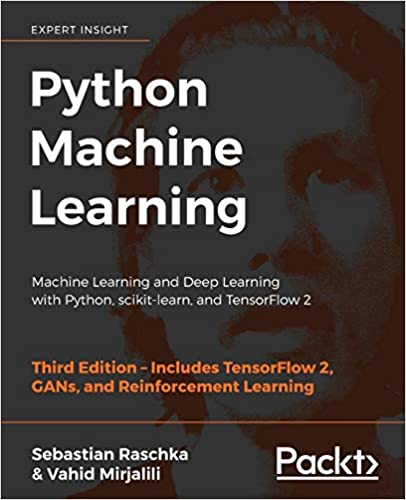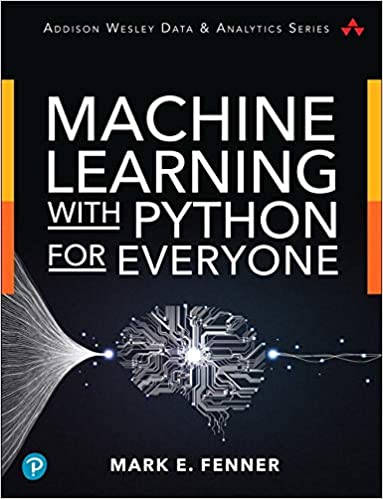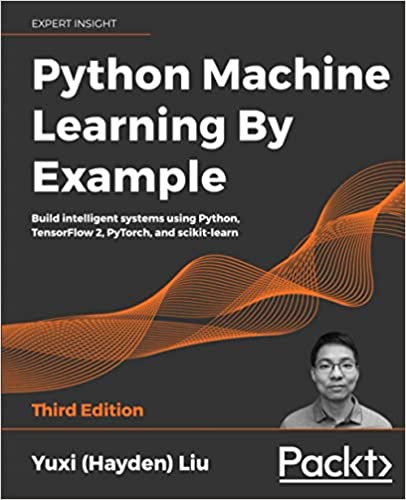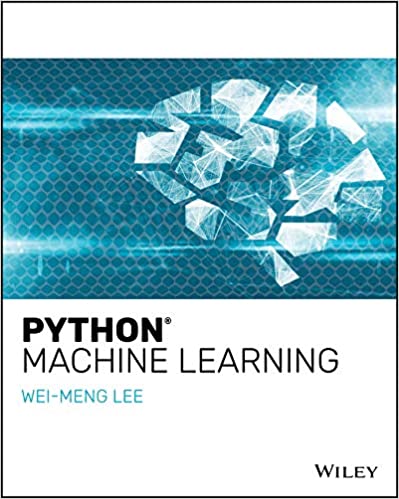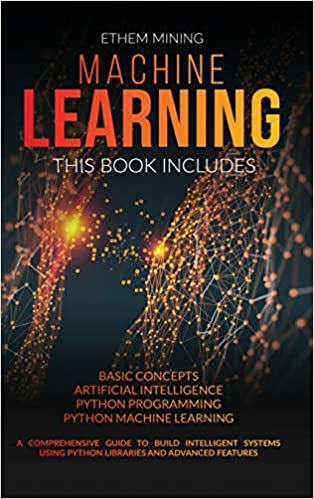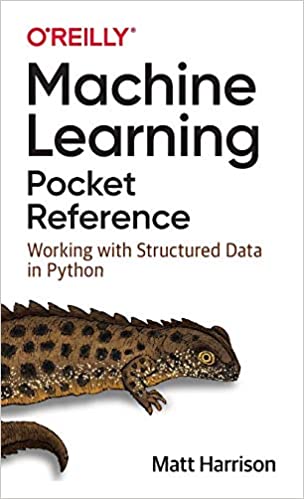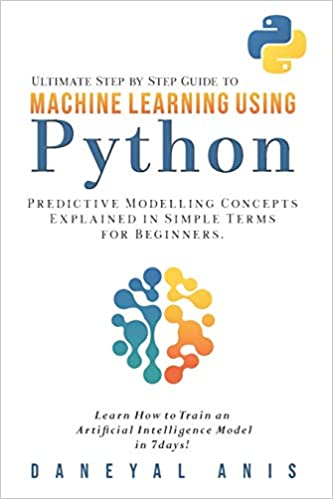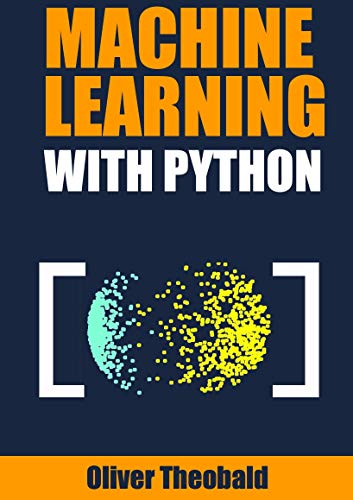Table of Contents
As multi-billion dollar industry, the machine learning market is expected to continue to explode in the next few years.
The time to get into machine learning has never been better.
And in this post, you’ll discover the 11 best Python machine learning books this year.
We’ll show you their features, layout, specific technologies taught, and more.
This post contains affiliate links. I may receive compensation if you buy something. Read my disclosure for more details.
TLDR: Python Machine Learning Books
🔥 Best Overall 🔥
Grokking Machine Learning
💥 Best for Machine Learning Newbies 💥
Python Machine Learning
💸 Best Value 💸
Machine Learning: 4 Books in 1
1. Grokking Machine Learning
Grokking Machine Learning by machine learning engineer Luis Serrano is arguably one of the best Python machine learning books for beginners.
Aside from having a cute cover, this book shows you how to apply machine learning to your projects while using only Python code and high school math.
As a newbie-friendly book, there’s no machine learning specialist knowledge required.
Using practical examples, you’ll progressively learn new concepts. In addition, you’ll build models for:
- spam detection
- language analysis
- image recognition
And more.
You’ll also work on plenty of Python exercises and mini projects to build your machine learning skills.
Grokking Machine Learning is also packed with illustrations to reinforce concepts.
2. Introduction to Machine Learning with Python
Second on our list of best Python machine learning books is Introduction to Machine Learning with Python by Andreas Muller and Sarah Guido.
While you don’t have to be a Python expert, you should have some experience with Python before reading this book.
First you’ll learn about machine learning fundamentals.
Then you’ll learn about commonly used machine learning algorithms and the pros and cons of each.
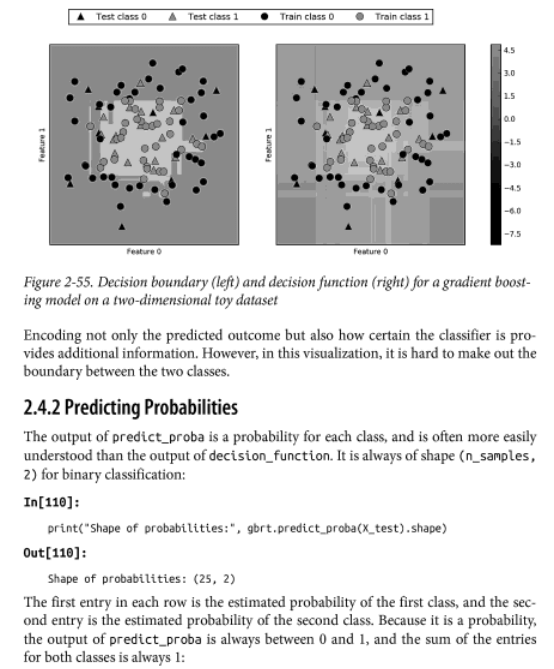
Next, you’ll learn how to focus on different aspects of data in order to represent processed data.
You’ll also learn about:
- model evaluation and parameter tuning using advanced methods
- encapsulating your workflow using chaining models
- methods for working with text data
And more.
Finally, you’ll learn how to improve your machine learning skills.
By the end of Introduction to Machine Learning with Python, you should be able to create machine learning applications with Python and the scikit-learn library.
Build a machine learning model with the course Build a Machine Learning Model with Python on Codecademy.
3. Machine Learning with Python Cookbook
Machine Learning with Python Cookbook by Chris Albon is your practical guide to machine learning. You’ll learn over 200 recipes for solving machine learning problems you’ll see in a typical day.
By becoming comfortable with Python and its libraries like scikit-learn and pandas, you’ll learn how to address problems like:
- loading data
- handling numerical data
- model selection
- linear and logical regression
And much more.
Each recipe includes copy-and-paste code you can use in your dataset. And from there, you can conform the code to help you construct applications.
Going beyond theory, you’ll also learn machine learning mechanics. Then you can create functioning machine learning applications.
4. Python Machine Learning, 3rd Edition
Python Machine Learning by Sebastian Raschka and Vahid Mirjalili is possibly one of the best Python machine learning books for improving scikit-learn and TensorFlow 2 skills.
That said, it’s also a comprehensive guide to many machine learning concepts.
It’s jam-packed with visuals and explanations. And there are plenty of working examples to cover essential machine learning fundamentals.
Some of what you’ll learn in Python Machine Learning includes:
- using scikit-learn for machine learning
- using TensorFlow for deep learning
- how to build and train neural networks
- best practices for evaluating and tuning models
- how to use regression analysis to predict outcomes
In addition, you’ll learn how machine learning applies to image classification, intelligent web apps and beyond.
You’ll also learn about sentiment analysis, a subfield of natural language processing (NLP).
You should have experience with Python before reading Python Machine Learning.

The book is very comprehensive, up-to-date, and keeps a nice balance of intuition and mathematical rigor.
– Oleksandr, Customer
Want to add some video to your machine learning journey? We recommend the course Machine Learning with Python on Coursera.
5. Machine Learning with Python for Everyone
Machine Learning with Python for Everyone by Mark Fenner is geared towards business analysts, students and others who are interested in mastering machine learning techniques.
First you’ll gain a practical understanding of machine learning processes.
Then you’ll learn how to implement those processes using Python and the scikit-learn library.
Some topics covered include:
- classification methods
- predicting numerical values
- evaluating classifiers
- regression methods
- tuning hyperparameters and pipelines
And much more.
The datasets included are detailed yet understandable to the untrained student.
And building on this foundation, you’ll find detailed real-world case studies to drive concepts home.
You’ll also work on practice code-alongs.
6. Python Machine Learning By Example
Python Machine Learning by Example by Yuxi (Hayden) Liu is another one of our favorites in our list of Python machine learning books.
It’s a comprehensive guide to machine learning with Python and machine learning algorithms and techniques.
First you’ll learn important concepts in machine learning and data science. Then you’ll use Python to explore data mining and analytics.
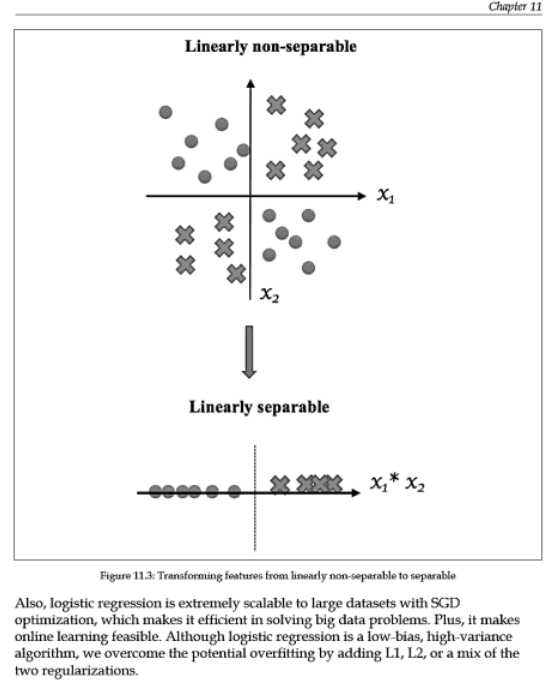
After that, you’ll learn how to scale a model using Apache Spark.
You’ll also learn how to build a machine learning model and optimize its performance.
This third edition contains six new chapters which include:
- developing a movie recommendation engine using Naive Bayes
- recognizing faces with support vector machine
- predicting stock prices with artificial neural networks
And more.
With realistic examples, you’ll understand the mechanics of machine learning techniques in areas such as exploratory data analysis and feature engineering.
By the end of Python Machine Learning by Example, you should understand machine learning best practices and be able to apply machine learning techniques to solve problems.
7. Python Machine Learning
Instead of machine learning theories, Python Machine Learning by Wei-Meng Lee teaches you machine learning by putting those theories into practice.
So be ready to get your hands dirty because you’ll be working on plenty of exercises.
You’ll start by learning the absolute fundamentals such as learning what exactly machine learning is.
And from there, you’ll learn about machine learning algorithms using real-world scenarios.
That’s where you’ll see how Python is used to solve various machine learning problems.
You’ll also learn about:
- data cleansing
- supervised and unsupervised algorithms
- deploying machine learning models
And much more.
Based upon the reviews, Python Machine Learning is best for absolute beginners who have absolutely no former knowledge of machine learning fundamentals.
8. Machine Learning: 4 Books in 1
As the title suggests, Machine Learning by Ethem Mining is 4 books in 1:
- Basic Concepts
- Artificial Intelligence
- Python Programming
- Python Machine Learning
So for many, this can be a one stop shop for learning machine learning concepts in Python.
Using simple language, you’ll learn machine learning and artificial intelligence fundamentals.
Then as you progress through the material, you’ll learn more advanced machine learning concepts.
In addition, you’ll learn the connection between machine learning and Big Data. And you’ll learn how to use Big Data to make your project or company scalable.
You’ll also learn about advanced programming techniques.
Machine Learning is geared towards absolute beginners with no experience in Python programming or machine learning.
However, it’s also useful for experienced learners who are seeking more useful insights into machine learning.
Very well written and the examples are very clear and concise… Each algorithm is discussed in detail with use cases and without drowning the reader in math proofs.
– Eileen, Customer
9. Machine Learning Pocket Reference
Machine Learning Pocket Reference by Matt Harrison is one of our favorite Python machine learning books.
But we recommend it for those who are already experienced in Python programming and have some background in machine learning.
First you’ll get a general overview of machine learning. And then you’ll jump into classification with structured data.
After that, you’ll learn methods for clustering, reducing dimensionality and beyond.
Using the Titanic dataset, you’ll go over classification.
Machine Learning Pocket Reference also touches upon:
- exploratory data analysis
- model selection
- scikit-learn pipelines
And more.
It also covers regression examples using k-nearest neighbor, decision trees and boosting.
Ready to prepare for your machine learning interview? Check out the course Practicing Machine Learning Interview Questions in Python on DataCamp.
10. Ultimate Step by Step Guide to Machine Learning Using Python
Machine Learning Using Python by Daneyal Anis will teach you how to train an artificial intelligence model in only 7 days.
But that depends on your learning pace and how much time you’re able to dedicate to reading the book and practicing the methods.
The first part of the book will introduce you to Python basics such as data structures and foundational libraries such as NumPy, seaborn and scikit-learn.
In the second part of the book, you’ll learn how to build predictive machine learning models.
You’ll do this by using step-by-step code examples and analysis, training and testing.
By the end of this book, you should be able to build new machine learning models from scratch. You’ll also know how to clean and prepare your data.
You should have a firm understanding of Python programming before reading Machine Learning Using Python.
11. Machine Learning with Python
And finally in our list of best Python machine learning books is Machine Learning with Python. Written by Oliver Theobald, this is the second book in a 3-part machine learning series. But this is the only one that focuses exclusively on Python programming.
In Machine Learning with Python, you’ll learn how to code 10 machine learning models in Python.
And by working on different projects, you’ll have the blueprints to design prediction models while using your own data.
And you’ll learn how to write the least amount of code by using pandas, scikit-learn, Matplotlib and seaborn.
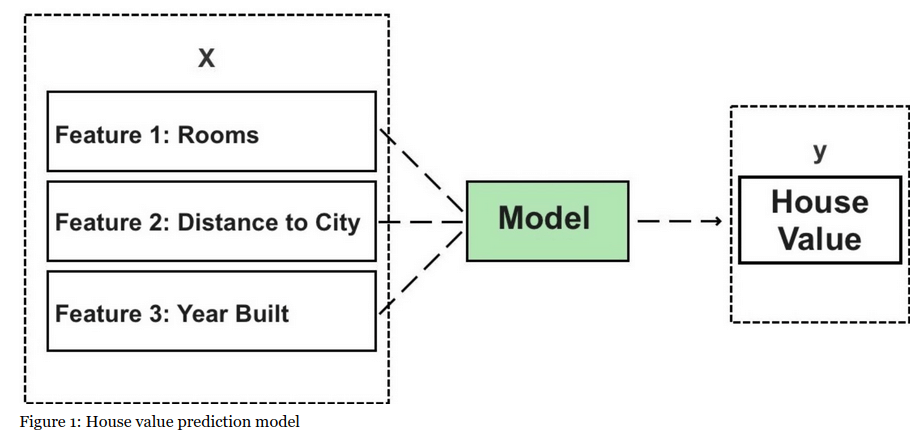
You’ll also learn how to visualize relationships in your dataset.
You should have a basic understanding of machine learning before reading Machine Learning with Python. This includes being familiar with common algorithms.
Python Machine Learning Books: Conclusion
So what are the best Python machine learning books this year?
In our opinion:
Best Overall
Grokking Machine Learning
Best for Machine Learning Newbies
Python Machine Learning
Best Value
Machine Learning: 4 Books in 1
So whether you’re looking for best value, best overall, or a newbie-friendly approach, we think there are Python machine learning books for everyone.
Data scientists searching for the best Python machine learning books may also be interested in:
- 6 Best Machine Learning Courses and Specializations
- Best Machine Learning Courses for Beginners
- Is Grokking the Machine Learning Interview by Educative Worth It? [Machine Learning Interview Preparation]
- 9 Best Data Science Courses for Beginners
- 18 Best Python Courses for Beginners
- Failed Coding Interview? [18 Best Coding Interview Resources for Bouncing Back]
What are the best Python machine learning books?
We chose 3 of the best Python machine learning books. For best overall, we think Grokking Machine Learning is the way to go. For machine learning newbies, we recommend Python Machine Learning. And for best value, we think Machine Learning: 4 Books in 1 is the clear winner. Read today’s post to find out more.
Is Grokking Machine Learning worth it?
Yes, we think Grokking Machine Learning is worth it. Written by machine learning engineer Luis Serrano, we believe it’s one of the best Python machine learning books for beginners. It will show you how to apply machine learning to your projects while using only Python code and high school math. There’s no machine learning specialist knowledge required. Using practical examples, you’ll progressively learn new concepts. You’ll also build models for spam detection, language analysis, image recognition and more. You’ll also work on plenty of Python exercises and mini projects to hone in on your machine learning skills. Grokking Machine Learning is also packed with illustrations to reinforce concepts and make learning more fun. Read our post to discover more.
Is Introduction to Machine Learning with Python worth it?
Introduction to Machine Learning with Python by Andreas Muller and Sarah Guido is one of our recommended Python machine learning books for beginners. While you don’t have to be a Python expert, you should have some experience with Python before reading this book. First you’ll learn about machine learning fundamentals. Then you’ll learn about commonly used machine learning algorithms and the pros and cons of each. Next you’ll learn how to focus on different aspects of data in order to represent processed data. Finally, you’ll learn how to improve your machine learning skills.
You’ll do all this while focusing on practical aspects of algorithms instead of math. By the end of Introduction to Machine Learning with Python, you should be able to create machine learning applications with Python and the scikit-learn library. Check out our post to find out more.
![11 best python machine learning books this year [learn machine learning asap]](https://realtoughcandy.com/wp-content/uploads/2021/04/cover-python-machine-learning-books-1024x576.jpg)
